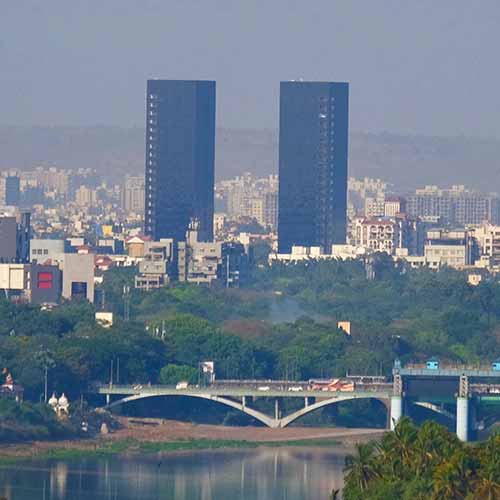NRI Corner - Real Estate Investment in India

Real Estate Investment Opportunities for NRIs in UAE
Why is the Indian real estate market a good investment option?
Benefits of investing in Indian Real Estate
- NRI's Top Investment Choice
- Growing real estate value
- High ROI on commercial properties
The purchase of real estate properties in India is a common form of investment among NRIs in the UAE. When purchased as a long-term investment, real estate proves to be a reliable source of profit. The real estate market in India's major cities has been consistently strong, making it a good investment opportunity. Many NRIs in UAE took advantage of the temporary stamp duty remission during the pandemic to invest in real estate and avoid paying a hefty fee.
Now is a good moment to invest, thanks to the rising value of real estate in India. You might also find promising real estate investment opportunities in the suburban regions outside of major cities. For instance, real estate has been booming in the ten to twenty-mile radius around major cities like Mumbai, Pune, Delhi, Gurgaon, Ahmedabad, etc.
Additionally, commercial buildings provide excellent opportunities for investment in India's real estate sector. The high rate of return from rentals and leases on commercial complexes, buildings, etc., makes them a desirable investment. In addition, yearly rent appreciation is anticipated in several areas, providing another incentive for investors.
Documents required for purchasing property
During the process of purchasing real estate in India, an NRI will need to have the following set of documents.
- Title Deed (in the name of the seller)
- Sanctioned Building Plan
- Commencement Certificate
- Occupancy Certificate
- Tax Paid Receipts
- Encumbrance Certificate
- Khata/Mutation Documents
List of Classified documents for Salaried and Self-Employed NRI Applicants:
| Salaried NRI Applicants | Self-Employed NRI Applicants |
|---|---|
| Copy of a valid passport showing visa stamps | Passport copy with valid visa stamps |
| Documentation proving the intended account holder's NRI status, such as a copy of a valid visa or work permit. | Information about the application and a copy of their business or trade license, or something similar, is required. |
| Overseas bank A/C for the last 3 months showing salary credits | 6 months of overseas bank account statements and NRE/ NRO account |
| Latest contract copy evidencing salary/ salary certificate/wage slips | Computation of income, P&L account and B/Sheet for last 3 years certified by the CA / CPA or any other relevant authority as the case may be (or equivalent company accounts) |
Why Adani Realty is an Optimum Choice for Investment
India's property market is expanding at a dazzling rate, making it one of the most important drivers of national income and prosperity today. According to estimates, real estate already contributes 7% to our GDP and is projected to rise to 13% in the coming years. Because of this, many NRIs living in the UAE decide to invest in real estate in India.
The innovative designs of Adani Realty, which include some of the most cutting-edge and luxurious dwellings available today, will provide you with the sense of belonging and security that you've been longing for.
Offerings of Adani Realty
A major participant in the international property industry, India, is on the rise. Due to the rapid urbanisation of India, prominent NRIs in the UAE are investing in residential and commercial properties in the country in return for promising substantial returns. And Adani Realty has left an indelible mark on some of India's largest and most recognisable metropolises.
Our Locations
Our Projects
NRI/PIO/OCI Real Estate Investment Guidelines
There are many guidelines that NRIs should be aware of, with taxation being the most important one.
Does Capital Gains Tax (CGT) apply to NRI/PIO/OCI?
The amount of tax payable to the government depends on whether the capital gains are long-term or short-term. Long-term capital gains take place when a property is sold after being owned for at least 24 months. When assets are sold after being kept for two years or less, the gains accrued by the sales of such properties are considered short-term.
If an NRI sells a property after owning it for at least 24 months, the profit arising from this transaction will be considered a long-term capital gain and will be taxed at the rate of 20.6%. On the other hand, if NRIs sell their property after owning it for less than 2 years, the proceeds of such transactions will be covered under a short-term capital gain. Such capital gains will be taxed at the rate of 30.9%.
However, there are some tax exemptions that NRIs can avail for their long-term capital gains. These tax exemptions are available under Section 54, Section 54 EC, and Section 54F.
Testimonials
Frequently Asked Questions
Under the general permission, the following categories can freely purchase immovable property in India:
- Non-Resident Indian (NRI) – that is a citizen of India residing outside India
- Person of Indian Origin (PIO) – that is an individual (not being a citizen of Pakistan or Bangladesh or Sri Lanka or Afghanistan or China or Iran or Nepal or Bhutan) who at any time, held an Indian passport or whose father or grandfather was a citizen of India by virtue of the constitution of India or the Citizenship Act, 1955 (57 of 1955).
However, the general permission covers only the purchase of a residential and commercial property.
Looking for dream spaces, not sure where to start?
Leave us a query and our representative will get back to you.








